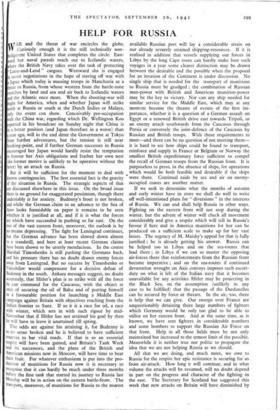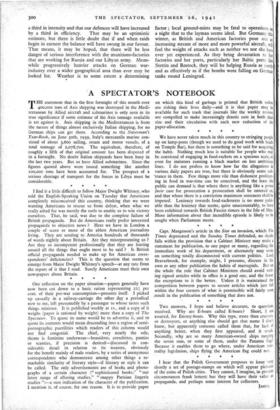HELP FOR RUSSIA .
AR and the threat of war encircles the globe. Curiously enough it is the still technically non- iligerent United States that completes the circle. East- rd her naval patrols reach out to Icelandic waters, ere the British Navy takes over the task of protecting Lease-and-Lend " cargoes. Westward she is engaged secret negotiations in the hope of staving off war with Japan which today is massing troops in Manchuria as a eat to Russia, from whose western front the battle-zone tretches by land and sea and air back to Icelandic waters d the Atlantic once more. When the shooting-war will gin for America, . when and whether Japan will strike orth at Russia or south at the Dutch Indies or Malaya, ly the event can show. Conceivably pre-occupation 'th the China war, regarding which Dr. Wellington Koo eported in his broadcast on Sunday night that China is t a better position (and Japan therefore in a worse) than year ago, will in the end deter the Government at Tokyo rom further adventures, but the tension is still near reaking-point, and if further German successes in Russia ncouraged her Japan would hardly resist the temptation honour her Axis obligations and feather her own nest the former motive is unlikely to be operative without the s latter) by an attack on Russia.
But it will be sufficient for the moment to deal with known contingencies. The first essential fact is the gravity of the situation in Russia. The strategic aspects of that are discussed elsewhere in this issue. On the broad issue there is no ground for exaggerated pessimism, though there undeniably is for anxiety. Budenny's front is not broken, and while the German claim to an advance to the Sea of Azov looks formidable on paper it remains to be seen whether it is justified at all, and if it is what the forces are which have succeeded in pushing so far east. On the rest of the vast eastern front, moreover, the outlook is by no means depressing. The fight for Leningrad continues, but the German advance has been slowed dowil almost to a standstill, and here at least recent German claims have been shown to be utterly mendacious. In the centre Marshal Timoshenko is still pushing the Germans back, and his pressure there has no doubt drawn enemy forces away from Leningrad. But no success by Timoshenko or Voroshilov would compensate for a decisive defeat of Budenny in the south. Ankara messages suggest, no doubt accurately, that Hitler's plan is to strike with all the force he can command for the Caucasus, with the object at once of securing the oil of Baku and of putting himself in a favourable position for launching a Middle East campaign against Britain with objectives reaching from the Indian frontier to Suez. If so it is a race for oil, a race With winter, which sets in with such rigour by mid- November that if Hitler has not attained his goal by then he will have to leave it unattained till spring.
The odds are against his attaining it, for Budenny is in no sense broken and he is believed to have sufficient reserves to bar vital roads. If that is so an essential respite will have been gained, and Britain's Tank Week and its successors, and the plans of the British and American missions now in Moscow, will have time to bear their fruit. For whatever enthusiasm is put into the pro- duction of munitions for Russia now it is necessary to recognise that it can hardly be much under three months before the first tank that started its journey to Russia last Monday will be in action on the eastern battle-front. The transport, moreover, of munitions for Russia to the nearest available Russian port will lay a considerable strain on our already severely strained shipping-resources. If it is realised in addition that vessels supplying our forces in Libya by the long Cape route can hardly make four such voyages in a year some clearer distinction may be drawn between the desirable and the possible when the proposal for an invasion of the Continent is under discussion. No single ship that is needed for the transport of munitions to Russia must be grudged ; the combination of Russian man-power with British and 'American munition-power may be the key to victory. Nor can any ship needed for similar service for the Middle East, which may at any moment become the theatre of events of the first im- portance, whether it is a question of a German assault on Egypt or a renewed British drive east towards Tripoli, or an enemy attack southwards from the Caucasus through Persia or conversely the joint-defence of the Caucasus by Russian and British troops. With these requirements to meet—and there can be no question of not meeting them— it is hard to see how ships could be found to transport, reinforce and supply in France or Belgium or Norway the smallest British expeditionary force sufficient to compel the recall of German troops from the Russian front. It is purposeless to press, in the absence of ships, for operations which would be both feasible and desirable if the ships • were there. Continual raids by sea and air on enemy- occupied coasts are another matter.
If we seek to determine what the months of autumn and early winter have in store we shall do well to write off well-intentioned plans for " diversions " in the interests of Russia. We can and shall help Russia in other ways. Fighting on the eastern front will not stop during the winter, but the advent of winter will check all movement considerably and give a respite which will tell in Russia's favour if here and in America munitions for her can be produced on a sufficient scale to make up for her vast losses. The urgency of M. Maisky's appeal for that is fully justified ; he is already getting his answer. Russia can be helped too in Libya and on the sea-routes that lead there ; in Libya if we can so master the opposing air-forces there that reinforcements from the Russian front become imperative ; and on the sea-routes if continued devastation wrought on Axis convoys imposes such escort- duty on what is left of the Italian navy that it becomes unavailable for any activities Hitler may be projecting in the Black Sea, on the assumption (unlikely in any case to be fulfilled) that the passage of the Dardanelles can be secured by force or threats. In the air, •too, there is help that we can give. Our sweeps over France are unquestionably detaining there large numbers of fighters which Germany would be only too glad to be able to utilise on her eastern front. And at the same time, as is known, we have sent fighters in considerable numbers and some bombers to support the Russian Air Force on that front. Help in all those fields must be not only maintained but increased to the utmost limit of the possible. Meanwhile it is neither true nor politic to propagate the idea that we are not helping Russia as we should.
All that we are doing, and much more, we owe to Russia for the respite her epic resistance is securing for us from air-attack. How long it will continue, and in what volume the attacks will be resumed, will no doubt depend in part on the progress and character of the fighting in the east. The Secretary for Scotland has suggested this week that new attacks on Britain will have diminished by a third in intensity and that our defences will have increased by a third in efficiency. That may be an optimistic estimate, but there is little doubt that if and when raids begin in earnest the balance will have swung in our favour. That means, it may be hoped, that there will be less danger of serious interference with the munitions-factories that are working for Russia and our Libyan army. Mean- while progressively heavier attacks on German war- industry over a wider geographical area than ever may be looked for. Weather is to some extent a determining factor ; local ground-mists may be fatal to operations on a night that to the layman seems ideal. But Germany this winter, as British and American factories pour out an increasing stream of more and more powerful aircraft, wili feel the weight of attacks such as neither we nor she have ever yet experienced. As they bring devastation to her factories and her ports, particularly her Baltic ports like Stettin and Rostock, they will be helping Russia as surely and as effectively as if the bombs were falling on German tanks round Leningrad.



























 Previous page
Previous page